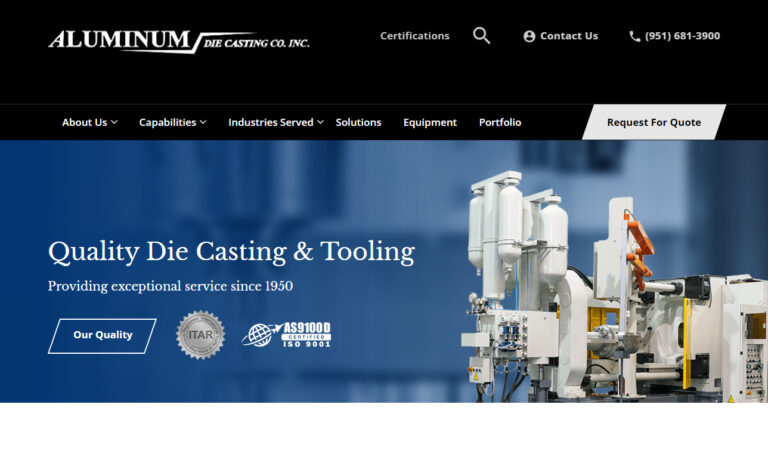Everything about Alcast Company
Everything about Alcast Company
Blog Article
How Alcast Company can Save You Time, Stress, and Money.
Table of ContentsAlcast Company Fundamentals ExplainedAlcast Company for DummiesLittle Known Questions About Alcast Company.Unknown Facts About Alcast CompanyHow Alcast Company can Save You Time, Stress, and Money.What Does Alcast Company Do?
The subtle distinction depends on the chemical material. Chemical Contrast of Cast Light weight aluminum Alloys Silicon promotes castability by decreasing the alloy's melting temperature level and enhancing fluidness throughout casting. It plays a critical role in enabling intricate molds to be filled up properly. Furthermore, silicon adds to the alloy's toughness and wear resistance, making it useful in applications where toughness is essential, such as automotive components and engine parts.It likewise boosts the machinability of the alloy, making it much easier to process right into finished products. This way, iron contributes to the general workability of aluminum alloys. Copper increases electric conductivity, making it helpful in electrical applications. It likewise boosts deterioration resistance and includes to the alloy's general strength.
Manganese adds to the toughness of aluminum alloys and enhances workability (Aluminum Casting). It is generally utilized in wrought light weight aluminum products like sheets, extrusions, and profiles. The presence of manganese aids in the alloy's formability and resistance to splitting during manufacture processes. Magnesium is a lightweight aspect that supplies strength and effect resistance to aluminum alloys.
Some Known Questions About Alcast Company.
Zinc boosts the castability of aluminum alloys and aids manage the solidification procedure throughout casting. It boosts the alloy's strength and solidity.

The key thermal conductivity, tensile toughness, return strength, and elongation differ. Select ideal basic materials according to the performance of the target product produced. Amongst the above alloys, A356 has the greatest thermal conductivity, and A380 and ADC12 have the least expensive. The tensile restriction is the contrary. A360 has the very best yield toughness and the highest elongation rate.
Alcast Company Fundamentals Explained

In accuracy casting, 6063 is appropriate for applications where elaborate geometries and high-grade surface finishes are paramount. Instances include telecommunication units, where the alloy's premium formability enables sleek and cosmetically pleasing styles while maintaining architectural integrity. In the Lighting Solutions sector, precision-cast 6063 components create stylish and efficient illumination components that need detailed forms and good thermal performance.
The A360 shows premium prolongation, making it suitable for complex and thin-walled components. In precision spreading applications, A360 is appropriate for industries such as Customer Electronic Devices, Telecommunication, and Power Tools.
Alcast Company Fundamentals Explained
Its distinct residential properties make A360 a beneficial choice for accuracy spreading in these sectors, enhancing item durability and quality. Light weight aluminum alloy 380, or A380, is a commonly used spreading alloy with a number of unique qualities. It provides excellent castability, making it a suitable option for precision casting. A380 exhibits good fluidness when molten, making certain intricate and comprehensive mold and mildews are accurately reproduced.
In accuracy casting, aluminum 413 radiates in the Consumer Electronic Devices and Power Tools markets. It's commonly utilized to craft detailed parts like smart device housings, video camera bodies, and power tool cases. Its precision is impressive, with limited resistances up to 0.01 mm, ensuring perfect product assembly. This alloy's exceptional corrosion resistance makes it an excellent choice for exterior applications, making certain resilient, sturdy products in the pointed out markets.
Some Known Incorrect Statements About Alcast Company
Once you have chosen that the light weight aluminum die casting procedure is ideal for your task, a vital following action is choosing one of the most ideal alloy. The aluminum alloy you pick will significantly affect both the casting procedure and the buildings of the end product. Since of this, you have to make your choice very carefully and take an educated strategy.
Determining one of the most suitable light weight aluminum alloy for your application will suggest weighing a large variety of features. These comparative alloy characteristics comply with the North American Pass Away Casting Organization's guidelines, and we have actually divided them right into two categories. The initial group addresses alloy characteristics that affect the production process. The second covers features influencing the buildings of the end product.
Alcast Company - An Overview
The alloy you choose for die spreading directly impacts numerous facets of the spreading process, like how easy the alloy is to collaborate with and if it is susceptible to casting issues. Hot cracking, also known as solidification splitting, is a regular die casting flaw for light weight aluminum alloys that can result in internal or surface-level tears or fractures.
Particular light weight aluminum alloys are much more at risk to warm splitting than others, and your selection needs to consider this. It can damage both the actors and the die, so you need to look for alloys with high anti-soldering homes.
Corrosion resistance, which is already a significant feature of aluminum, can vary significantly from alloy to alloy and is a crucial particular to take into consideration depending Your Domain Name upon the environmental problems your product will certainly be subjected to (Aluminum Casting). Put on resistance is an additional home generally looked for in aluminum products and can differentiate some alloys
Report this page